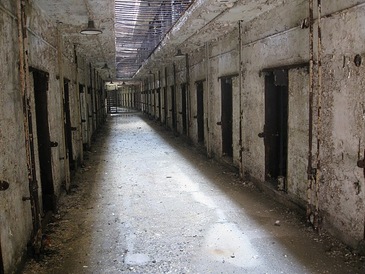Research.
I have spent the past four years in graduate school studying geography, and I am particularly interested in the interface between geography and law and the geography of exclusion – spaces and practices that result in inequality and separation. Here is a brief listing of the topics I am interested in and some of the research projects I have worked on.
Prison. The geography of America's prison system is fascinating, and I have been exploring the links between inmates who are incarcerated in remote areas far from urban centers (like in New York or California) and reintegration into society and recidivism. I am also interested in representations of punishment in former prison sites, and I have worked on a project on prison museums in the American West and their connections to the contemporary prison system.
Police. Much of my graduate research has been dedicated to the study of police practices in the United States and the former Soviet Union, particularly how these practices relate to public space. I have studied police departments in Boulder, Colorado and Middlebury, Vermont, where I examined community policing and outreach strategies. I am currently completing my Master's thesis in Geography, which is a study of police strategies to control access to public space for political demonstrations in Moscow and St. Petersburg.
Capital Punishment. America's insistence on putting people to death for their crimes is almost unique in the industrialized world. The death penalty is a fascinating venue to explore my interests in the intersection of law, geography, and the individual. While 15 states have abolished the death penalty, the expansion of the federal death penalty has made more crimes death-eligible than ever before, and the Justice Department has sought executions in many states that have eliminated the practice in their state courts, essentially making no state or territory safe haven from the executioner, despite the protestations of local residents.
Islands of New York City. With the exception of the Bronx, New York is a city of islands. While Manhattan may be at the center of the world, the dozens of smaller islands that make up the city's archipelago have been used as prisons, quarantines, military bases and paupers graves, sites that isolate and obscure the living and the dead. I am interested in exploring these sites, as a journalist, academic, and avid canoeist.
Nationalism. National identities are expressed in many ways, from the banal to the sacred. I have studied the Russian Orthodox Church and resurgent Russian nationalism; communal identities in pseudo-states like Transdnistria and the Republika Srpska; and the connections between sport and nationalism in a variety of contexts, including Canada, the United States and Russia.

